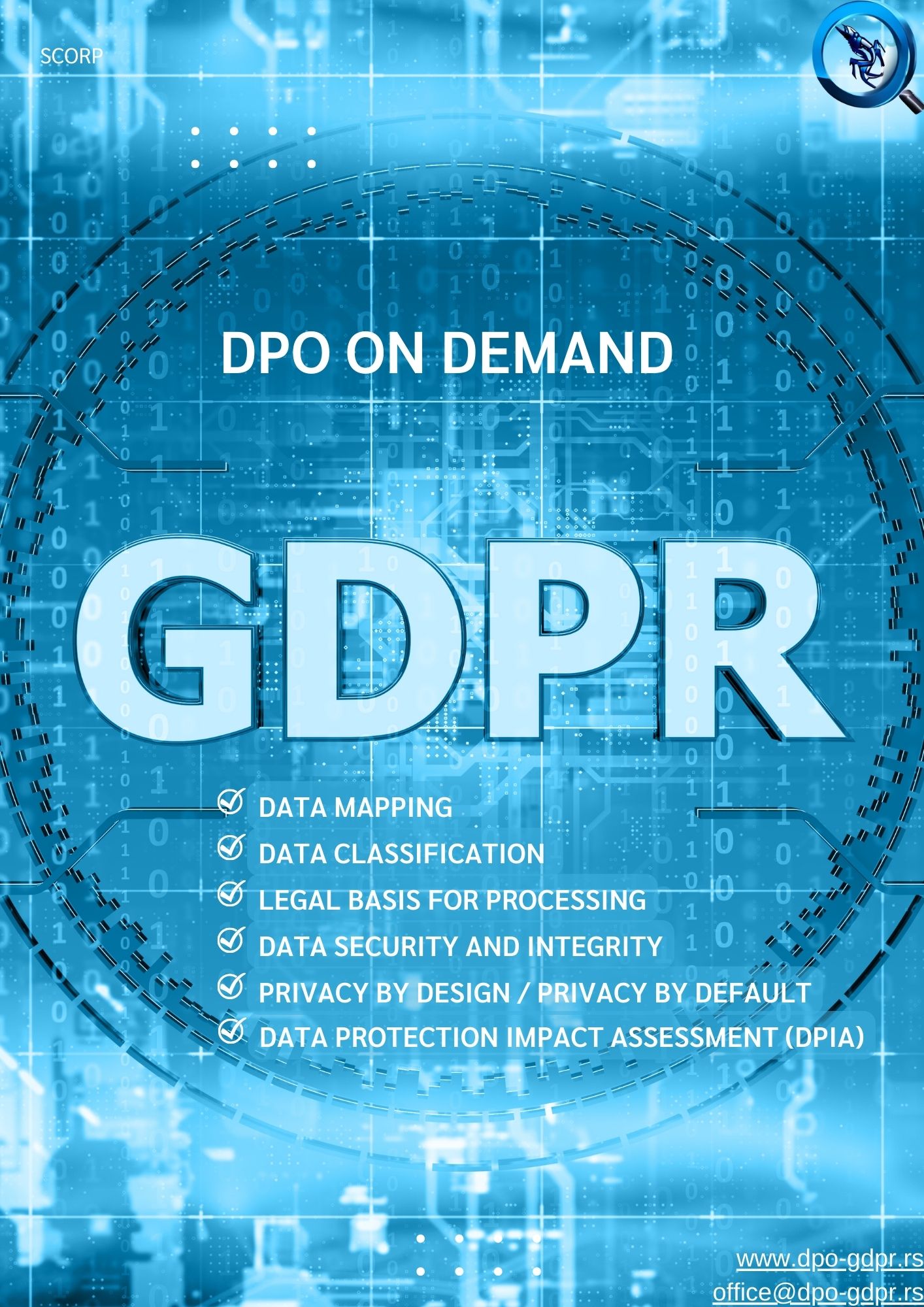As businesses increasingly operate in a global digital environment, compliance with GDPR standards is a legal obligation and a strategic imperative for safeguarding data and maintaining stakeholder trust. Our GDPR Support services are meticulously crafted to empower organizations to navigate the complexities of the General Data Protection Regulation (GDPR).
Tailored Compliance Strategies
At SCORP, we understand that each organization is unique in its data processing activities. Our GDPR Support services begin with a comprehensive analysis of your data practices. We then tailor compliance strategies to ensure your processes align seamlessly with GDPR’s stringent requirements, mitigating non-compliance risk.
General GDPR Compliance Consulting
Our team of experts provides general GDPR compliance consulting, offering insights into the intricacies of the regulation. From understanding the lawful bases for processing personal data to ensuring data subject rights, we guide you through the hints of GDPR, fostering a culture of compliance within your organization.
GDPR Awareness Training
We believe that knowledge is critical to compliance. Our GDPR awareness training programs are designed to equip your team with the understanding and skills necessary to navigate GDPR requirements confidently. Stay ahead of the curve by empowering your staff with the knowledge to protect and handle personal data responsibly.
GDPR Compliance Guide Development
Navigating the vast landscape of GDPR can be challenging. SCORP assists in developing a GDPR compliance guide tailored to your organization’s specific needs. This guide serves as a roadmap, outlining steps, procedures, and best practices to ensure ongoing compliance with the regulation.
Data Protection Impact Assessment (DPIA)
Understanding the impact of data processing activities on individuals’ privacy is fundamental. Our GDPR Support services include conducting Data Protection Impact Assessments (DPIAs) to identify, assess, and mitigate risks associated with data processing activities, ensuring that your organization’s practices align with GDPR requirements.
IT Forensics and Cybersecurity Compliance
The GDPR strongly emphasizes the security and confidentiality of personal data. SCORP collaborates with your organization to ensure your IT infrastructure is defended against potential breaches. Our IT Forensics and Cybersecurity Compliance services are integral to maintaining the integrity of your data processing systems.
Cross-Border Data Transfer Solutions
In an era of globalized business, cross-border data transfers are common. SCORP provides solutions to facilitate the lawful transfer of personal data across borders, ensuring that your organization meets GDPR requirements even in international data processing scenarios.
Collaboration with Legal Professionals
SCORP collaborates with legal professionals well-versed in GDPR, ensuring that our support services align with international and domestic legal standards. This collaborative approach provides you with a comprehensive understanding of the legal landscape surrounding GDPR compliance.
At SCORP, our GDPR Support services are not just about compliance; they are about empowering your organization to embrace a culture of data protection and privacy.
Trust us to be your strategic partner in navigating the complexities of GDPR, safeguarding the trust of your clients, employees, and stakeholders while positioning your organization as a responsible steward of personal data.
The process of achieving and maintaining General Data Protection Regulation (GDPR) compliance involves a series of systematic steps and ongoing measures to ensure that an organization processes personal data in a lawful and transparent manner, prioritizing the privacy and rights of individuals. Below is a comprehensive description of the GDPR compliance process:
-
Initial Assessment:
- Data Mapping – Conduct a thorough inventory of the personal data your organization processes, including its origin, flow, and storage locations.
- Data Classification – Categorize the types of personal data you handle, distinguishing between sensitive and non-sensitive information.
-
Legal Basis for Processing:
- Identify and document the lawful basis for processing personal data. Common lawful bases include consent, contract necessity, legal obligation, vital interests, and legitimate interests.
-
Data Subject Rights:
- Establish procedures to ensure individuals (data subjects) can exercise their GDPR-granted rights, such as the right to access, rectification, erasure, and data portability.
- Develop mechanisms to handle and respond promptly to data subject requests.
-
Privacy by Design and by Default:
- Integrate privacy considerations into the design of new processes, products, or services (Privacy by Design).
- Default settings should prioritize the least amount of data processing necessary for the intended purpose (Privacy by Default).
-
Data Protection Impact Assessment (DPIA):
- Conduct DPIAs for high-risk processing activities, assessing the impact on data subjects’ rights and freedoms.
- Implement measures to mitigate identified risks and obtain regulatory approval if necessary.
-
Data Security and Integrity:
- Implement robust security measures to safeguard personal data against unauthorized access, disclosure, alteration, and destruction.
- Regularly update security protocols and conduct risk assessments to address evolving threats.
-
Data Breach Response:
- Develop and implement a clear and compelling data breach response plan, outlining procedures for identifying, reporting, and mitigating breaches.
- Notify the relevant supervisory authority and affected individuals within the specified timeframe if a breach occurs.
-
Records of Processing Activities:
- Maintain comprehensive records of all data processing activities, including the purposes, categories of data, recipients, and retention periods.
- These records serve as a valuable resource for demonstrating GDPR compliance to regulatory authorities.
-
Appointment of Data Protection Officer (DPO):
- Appoint a Data Protection Officer if your organization’s processing activities require it under GDPR.
- The DPO is responsible for advising on compliance, monitoring internal processes, and serving as a point of contact for data protection matters.
-
Cross-Border Data Transfers:
- Implement safeguards for international data transfers, such as Standard Contractual Clauses (SCCs) or Binding Corporate Rules (BCRs), to ensure compliance with GDPR’s restrictions on cross-border data transfers.
-
Ongoing Training and Awareness:
- Conduct regular training sessions to raise employee awareness about GDPR requirements and the importance of data protection.
- Keep staff informed about updates to policies and procedures.
-
Regular Compliance Audits:
- Conduct regular internal audits to assess and monitor ongoing compliance with GDPR principles and requirements.
- Adjust policies and procedures based on audit findings and changes in the regulatory landscape.
-
Regulatory Reporting:
- Cooperate with supervisory authorities and promptly report any breaches or non-compliance.
- Respond transparently and proactively to inquiries from regulatory bodies.
The GDPR compliance process is dynamic and requires ongoing commitment and adaptability to ensure that an organization continues to meet its data protection obligations. Regular reviews, updates, and a proactive approach to privacy are essential elements in achieving and sustaining GDPR compliance.
Customized DPO Support
SCORP stands out as a Data Protection Officer (DPO) support services leader. Recognizing the significance of having a dedicated and knowledgeable DPO, we offer specialized support to organizations needing this role.
Our legal professionals at SCORP have extensive experience acting as appointed DPOs for various organizations, providing unparalleled expertise in navigating the complexities of GDPR compliance.
Proactive DPO Services
As your trusted DPO, SCORP’s legal professionals take a proactive approach, ensuring that your organization is at the forefront of GDPR compliance.
We actively monitor regulatory developments, assess the impact on your data processing activities, and provide timely guidance to keep your organization abreast of changes in the data protection landscape.
Tailored DPO Solutions
SCORP understands that the DPO role should be tailored to each organization’s unique needs. We provide customized solutions that align with your industry, size, and specific data processing activities.
Our legal professionals work closely with your team to offer tailored DPO services that address your organization’s challenges and foster a culture of continuous GDPR compliance.
Established Clientele
SCORP takes pride in its well-established list of clients who benefit from our legal professionals’ expertise acting as appointed DPOs.
Our clientele spans various industries, showcasing the versatility of our DPO support services and our ability to adapt to the unique requirements of different organizations.
Legal Professionals as Trusted Advisors
Our legal professionals, serving as appointed DPOs, act as trusted advisors to your organization. We bring legal insight, practical experience, and a deep understanding of GDPR to guide your data protection initiatives.
SCORP’s legal professionals bridge your organization and regulatory authorities, providing valuable insights and strategic counsel to ensure compliance with GDPR requirements.
Seamless Integration
SCORP seamlessly integrates our legal professionals into your organization’s structure, facilitating a collaborative approach to data protection.
We work closely with your internal teams to enhance awareness, streamline processes, and instill a data protection mindset throughout your organization.
Choose SCORP for DPO support and benefit from the expertise of our legal professionals who act as appointed DPOs for a diverse range of clients. We bring a wealth of experience to guide your organization through the complexities of GDPR compliance, offering proactive solutions and strategic insights to ensure the protection of personal data and maintain the highest standards of data privacy.







